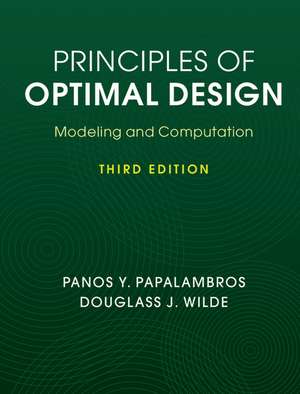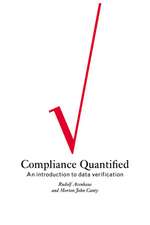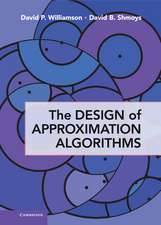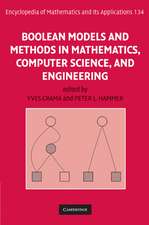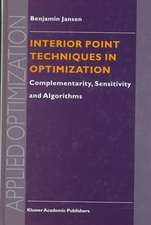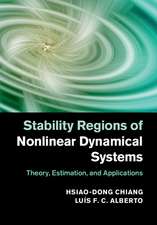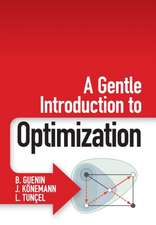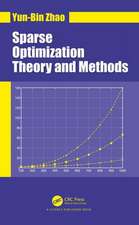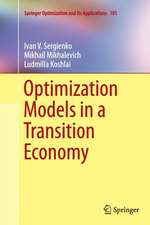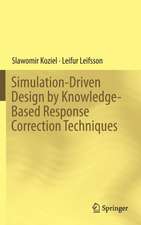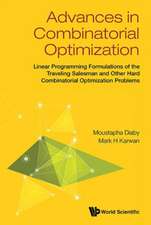Principles of Optimal Design: Modeling and Computation
Autor Panos Y. Papalambros, Douglass J. Wildeen Limba Engleză Hardback – 8 ian 2017
Preț: 532.30 lei
Preț vechi: 598.09 lei
-11% Nou
Puncte Express: 798
Preț estimativ în valută:
101.85€ • 106.34$ • 84.30£
101.85€ • 106.34$ • 84.30£
Carte tipărită la comandă
Livrare economică 04-18 aprilie
Preluare comenzi: 021 569.72.76
Specificații
ISBN-13: 9781107132672
ISBN-10: 1107132673
Pagini: 504
Ilustrații: 75 b/w illus.
Dimensiuni: 196 x 254 x 28 mm
Greutate: 1.26 kg
Ediția:3Revizuită
Editura: Cambridge University Press
Colecția Cambridge University Press
Locul publicării:New York, United States
ISBN-10: 1107132673
Pagini: 504
Ilustrații: 75 b/w illus.
Dimensiuni: 196 x 254 x 28 mm
Greutate: 1.26 kg
Ediția:3Revizuită
Editura: Cambridge University Press
Colecția Cambridge University Press
Locul publicării:New York, United States
Cuprins
Preface; Notation; 1. Optimization models; 2. Model construction; 3. Model boundedness; 4. Interior optima; 5. Boundary optima; 6. Local computation; 7. Nongradient search; 8. Systems design; 9. Principles and practice; Notes; References; Author index; Subject index.
Recenzii
'Principles of Optimal Design, third edition, offers an excellent combination of depth and breadth of fundamentals of mathematical modeling of systems design. Students and practitioners will find the textbook a great starting point to learn about the systems design methods and optimization theories from the fundamentals to the advanced numerical methods. The recent addition of the decomposition-based optimization method and analytical target cascading is a nice expansion to the traditional optimization methods. I use this textbook to teach graduate and advanced undergraduate students who have basic understanding of numerical analysis. Students appreciate the spectrum of contents and they become ready to apply what they learn from the textbook to complex systems design cases. I highly recommend the textbook.' Harrison Hyung, University of Illinois, Urbana-Champaign
'Principles of Optimal Design has always been a well-structured textbook that introduces students to the fundamentals of optimal design while remaining accessible and enjoyable to read. The latest edition adds many brief but exciting glimpses of more advanced topics in optimization. These additions have transformed the book from a 'foundation' on which students can firmly stand to a 'catapult' that can propel them to exciting, new, and advanced topics in the broad discipline of optimal design.' Hosam Fathy, Penn State College of Engineering
'This third edition brings to the reader an impressive array of new and useful topics in optimal design. For example, and among others, new chapters on non-gradient based methods and decomposition-based optimization (or multi-disciplinary optimization, MDO) have been added. The book can be used both as a textbook for a graduate level course in all engineering fields, but also as a must have reference material. I highly recommend it!' Shapour Azarm, University of Maryland
'The Principles of Optimal Design, third edition, is an excellent first text for undergraduates and graduate students alike interested in gaining a firm grasp of practical design optimization methods. It blends the latest modeling techniques with a rigorous treatment of the mathematical analysis, allowing one to adeptly navigate the varied landscapes of modern design problems. From machine learning, automotive systems, financial portfolios, to even the modeling of human purchasing behavior, I have used this text to teach my students how to systematically apply the design process to a broad range of engineering problems.' George J. Delagrammatikas, The Cooper Union for the Advancement of Science and Art, New York
'This book, almost thirty years after its first edition, remains the only comprehensive text on engineering design optimization. In our 'one-click' software era, it provides theory fundamentals that tend to be neglected, while complementing them with rigorous modeling and computation techniques. I cannot think of a better textbook for engineering optimization courses, including a plethora of excellent examples and exercises. The third edition is enhanced with new and extremely useful material on recent developments in derivative-free optimization and optimal system design.' Michael Kokkolaras, McGill University, Canada
'I've found Principles of Optimal Design to be an excellent, comprehensive explanation of design optimization methods, grounded in rigorous mathematics, yet still accessible. The addition of a gradient-free optimization chapter is a welcome addition to the book.' John Whitefoot, University of Pittsburgh
'I've recommended this book to several students. It's a great resource for students who need to use optimization for practical purposes, such as a senior project or an assignment at their co-op job. The book has a good balance between the underlying theory and the application of that theory to actual problems.' Diane Peters, University of Michigan
'Principles of Optimal Design has always been a well-structured textbook that introduces students to the fundamentals of optimal design while remaining accessible and enjoyable to read. The latest edition adds many brief but exciting glimpses of more advanced topics in optimization. These additions have transformed the book from a 'foundation' on which students can firmly stand to a 'catapult' that can propel them to exciting, new, and advanced topics in the broad discipline of optimal design.' Hosam Fathy, Penn State College of Engineering
'This third edition brings to the reader an impressive array of new and useful topics in optimal design. For example, and among others, new chapters on non-gradient based methods and decomposition-based optimization (or multi-disciplinary optimization, MDO) have been added. The book can be used both as a textbook for a graduate level course in all engineering fields, but also as a must have reference material. I highly recommend it!' Shapour Azarm, University of Maryland
'The Principles of Optimal Design, third edition, is an excellent first text for undergraduates and graduate students alike interested in gaining a firm grasp of practical design optimization methods. It blends the latest modeling techniques with a rigorous treatment of the mathematical analysis, allowing one to adeptly navigate the varied landscapes of modern design problems. From machine learning, automotive systems, financial portfolios, to even the modeling of human purchasing behavior, I have used this text to teach my students how to systematically apply the design process to a broad range of engineering problems.' George J. Delagrammatikas, The Cooper Union for the Advancement of Science and Art, New York
'This book, almost thirty years after its first edition, remains the only comprehensive text on engineering design optimization. In our 'one-click' software era, it provides theory fundamentals that tend to be neglected, while complementing them with rigorous modeling and computation techniques. I cannot think of a better textbook for engineering optimization courses, including a plethora of excellent examples and exercises. The third edition is enhanced with new and extremely useful material on recent developments in derivative-free optimization and optimal system design.' Michael Kokkolaras, McGill University, Canada
'I've found Principles of Optimal Design to be an excellent, comprehensive explanation of design optimization methods, grounded in rigorous mathematics, yet still accessible. The addition of a gradient-free optimization chapter is a welcome addition to the book.' John Whitefoot, University of Pittsburgh
'I've recommended this book to several students. It's a great resource for students who need to use optimization for practical purposes, such as a senior project or an assignment at their co-op job. The book has a good balance between the underlying theory and the application of that theory to actual problems.' Diane Peters, University of Michigan
Notă biografică
Descriere
This textbook presents key concepts and algorithms available for solving design optimization problems, with simple examples to demonstrate.
